Video Games That Ask Deep Philosophical Questions
“The un-examined game is not worth playing.” – Socrates (kind of)
Philosophy is the study of the “big” questions of life. Questions like, “What is the true nature of reality?”, “What is consciousness?”, or “What is the nature of good and evil?” are among some of the oldest questions, and they have been explored in various forms of human culture throughout history, be it literature, poetry, film, etc. It should come as no surprise, then, that philosophical questions have found their way into the medium of video games. In recent years, video games have advanced to the level of sophistication and depth of their close cousins in entertainment, literature and film. More and more, games are conveying complex narratives that are chock full of deep ideas and philosophical themes. Games are no longer just fun to play, but also fun to think about. A good game presents ideas that keep you engaged even when you turn the console off. Video games present worlds, situations, and ideas we have never encountered before, and they can provide us with a novel context in which to investigate philosophical issues. As a salute to the impressive philosophical depth of modern video games, here are 5 games that force us to consider the big questions in life.
Also – SPOILER ALERT- for most games on this list.
Bioshock Infinite: Many-Worlds Interpretation of Quantum Mechanics
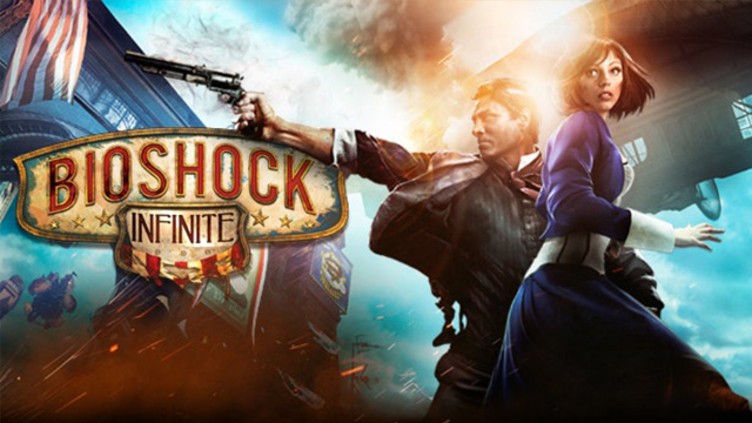
Most articles on philosophy in video games take their cue from the first Bioshock, released in 2007. However, the third game in the series, Bioshock Infinite does a wonderful job serving as a stand alone title with its own story, while keeping in line with the same dystopian atmosphere and action packed gunplay that made the previous entries modern day masterpieces. Bioshock Infinite has you take on the role of Booker DeWitt, an ex-Pinkerton agent tasked with saving a woman held hostage in the steampunk-esque sky city of Columbia. Through the events of the game, you discover that the world you are in is just one of infinitely many parallel worlds, in each of which slightly alternate histories are obtained. At the end of the game, it is revealed that the main antagonist, the evangelical patriarch Zachary Comstock, is actually a version of Booker DeWitt from an alternate world, a world in which DeWitt turned to religion after his years in the military.

The narrative fiction of parallel universes draws inspiration from the real world Many-Worlds Interpretation (MWI) of quantum mechanics. Essentially, the MWI seeks to answer a conundrum in the conceptual foundations of quantum mechanics that has puzzled philosophers and scientists since the inception of quantum mechanics. The main issue is, quantum mechanics cannot tell us whether a specific outcome will happen or not. All quantum mechanics can do is give us a probability that a certain outcome will obtain. Quantum mechanics cannot tell us why a specific outcome happened over any other outcome in any given case. The MWI answers this problem by stating that, in fact, all possible outcomes actually occur. For every given possible outcome, there is some branch of reality where that outcome actually happened. The reason we only see one particular outcome happening is because we are in the branch of reality where that outcome happened. The MWI interprets the mathematics of quantum mechanics as representing an infinitely-branching multi-faceted reality.
The influence that Bioshock Infinite draws from the real world MWI is apparent. Even the main character’s name Booker DeWitt is based on the name of the notable theoretical physicist-philosopher Bryce DeWitt, who was a major proponent and popularizer of the MWI. Bioshock Infinite uses the MWI to pose various questions about human existence: if every possible outcome actually happens, how can we say we are free to choose our own live? In what sense are we individuals if there are an infinite amount of ourselves in existence, each slightly different from the other? If the MWI is true, does that mean that everything is predetermined? If the MWI is true, and every possible outcome actually happens, why should one be motivated to act a certain way if it will happen no matter what? Is a person morally responsible for the deeds that alternate versions of them perform? Bioshock Infinite wraps up all these questions and more in a package that is exhilarating, deep, and delightfully twisted.
SOMA: Artificial Intelligence, Consciousness, and Self-Identity
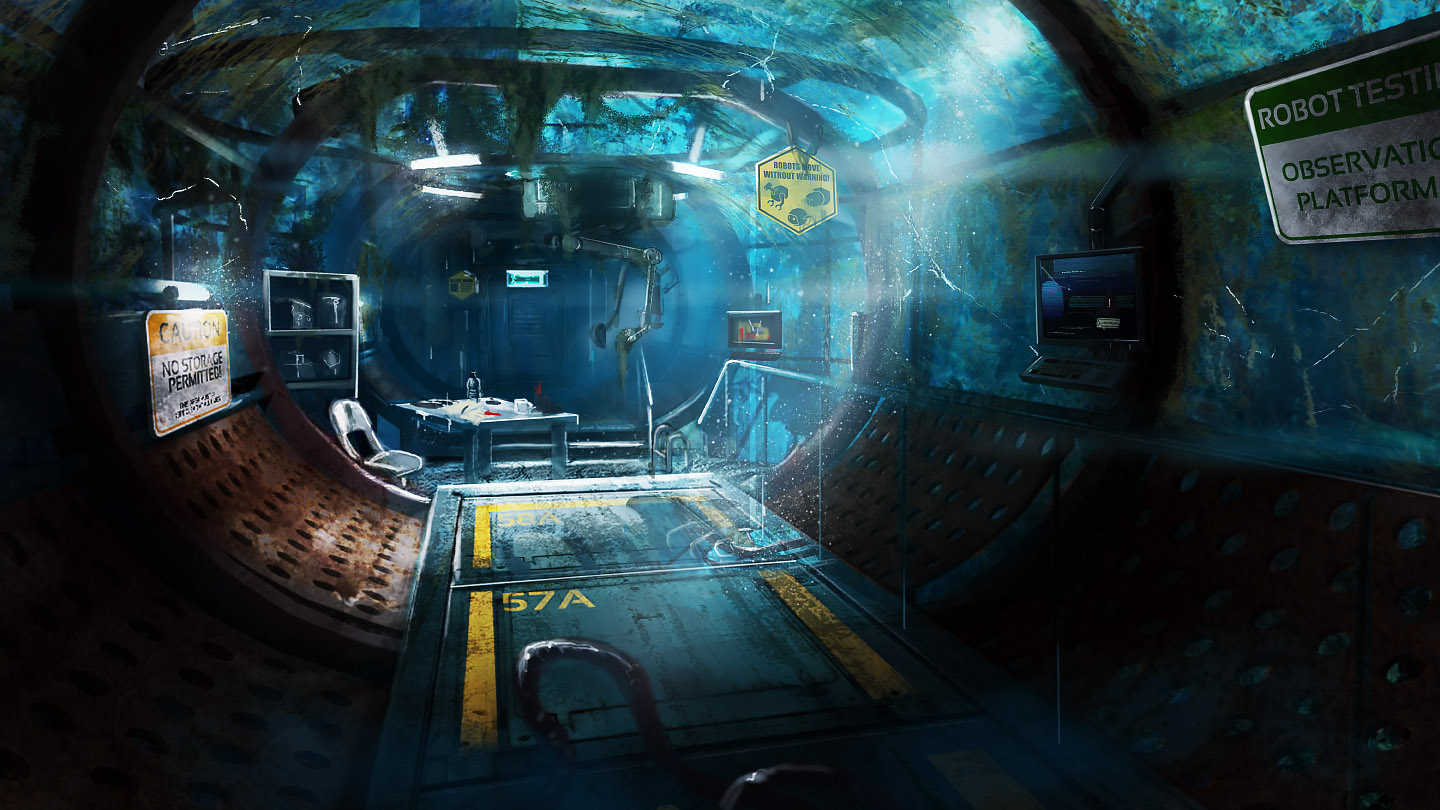
Can a machine think? What does it mean to say that one is the same person that one was 5 years ago? Is a person just a collection of memories, personality traits, and beliefs, or is there something more to one’s identity? SOMA sees the player take on the role of Simon Jarett, a man who is contracted to be part of a revolutionary new neurological study, one that proceeds by making a one-to-one digital map of the brain for diagnostic and experimental purposes. After the procedure, Simon awakens in an abandoned underwater research facility called PATHOS-II. While exploring the abandoned facility, Simon meets many different machines that have eerily human characteristics. After some exploration, the player character discovers that they are actually a machine that has a digital copy of Simon’s mind uploaded into its body. This poses the interesting question: is the player character the original Simon, or someone else? Is the player character really a conscious being, or just an imitation of the real thing?
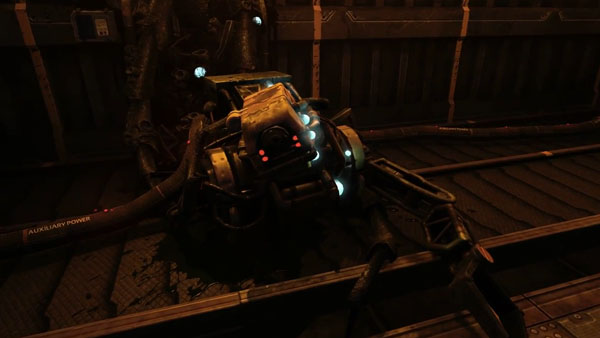
SOMA deals with primarily two major philosophical questions: (1) Can a machine truly be conscious? and (2) What does it mean to stay the same person over time? With respect to (1), the possibility of a genuine artificial intelligence has implications for our understanding of consciousness. Is being conscious really just the result of brain processes happening, and can we simulate that phenomena in a computer? The philosopher Rene Descartes famously argued that humans are not identical to their physical bodies; he argued that a person is primarily an immaterial mind. The possibility of a conscious machine seems to be evidence against this position though. Does that imply the soul does not exist? Moreover, if we successfully created a conscious machine, what kind of moral obligations would we have to it? Would we be obligated to treat it with dignity and respect, just like another human? Would it be ethical to make such a machine do work for us? Given the state of current AI research, these sorts of issues are no longer speculative. They are almost tangible realities that need to be seriously addressed sooner than later.
With respect to (2), the possibility of copying one’s mind seems to imply that an individual person is nothing more than a set of brain processes occurring. If we can recreate the same brain processes, then would we recreate one and the same person? This view seems to lead to some odd conclusions though. It implies that if someone made a copy of their mind and uploaded it to a machine, there would actually be two of the original person. How is that possible? Perhaps the possibility of copying one’s mind implies that actually, there is no unified self that persists over time. Maybe all there is to a person is a transient collection of thoughts, and the persistence of an underlying self is an illusion. SOMA has the guts to ask the hard questions, and it does not hesitate to confront head on what may seem to be unsettling truths about the nature of consciousness and the self.
MGSV: The Phantom Pain: Language, Culture, and Imperialism
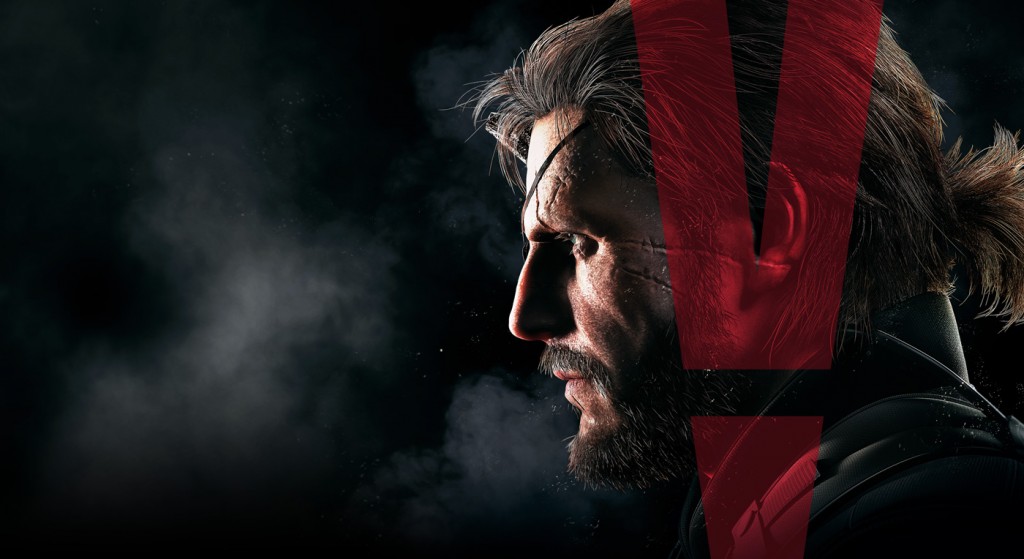
Obviously, a Metal Gear game was going to appear on this list. The enigmatic auteur Hideo Kojima is not afraid to engage in extremely complex thematic analysis (and lengthy cut scenes) in his critically acclaimed Metal Gear series. Spanning over 60 years in an alternate history post WWII earth, the Metal Gear series has raised issues relating to the nature and effects of war and conflict, the ideal political arrangement of society, and the moral dimensions of government control and human liberty. MGSV: The Phantom Pain investigates the contemporary and relevant topic of the effects of historical colonialism, imperialism, and racism. MGSV: The Phantom Pain follows the exploits of the mercenary group Diamond Dogs, founded by the legendary soldier Big Boss a.k.a Venom Snake, and their fight against the terrorist organization Cipher. Central to the narrative is the role that language plays in propagating and maintaining oppressive power structures in society. A major plot element of the game involves a Native American biologist working for Cipher, nicknamed “Codetalker”, who genetically engineers a powerful bioweapon parasite that infects and kills speakers of a particular language. Codetalker is motivated in his research primarily by his hatred of the English language, and the role that the English language played in the extermination of his people and culture, the Navajo.
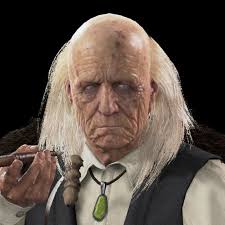
The Kenyan author Ngugi wa Thiong’o wrote, “The choice of language and the use to which it is put are central to a people’s definition of itself in relation to its natural and social environment, indeed in relation to the entire universe” (1985). In other words, language provides a mechanism by which a culture bestows an identity upon itself. Language is a medium in which culture survives, and one way to exterminate a culture is to exterminate its language. This was precisely the strategy taken by many governmental policies in North America during the 19th and 20th century. Native peoples were often taken from their families as children, sent to European boarding schools, and forbidden to have ties with their own culture or speak their own language. These policies resulted in the essential annihilation of large parts of Native American cultures, in virtue of exterminating the languages and practices integral to those cultures’ identities.
MGSV: The Phantom Pain is in many ways an uncomfortable game. It forces players to confront the very real and pressing effects that colonialism and imperialism have had on the modern state of the world. The fact of the matter is that large parts of modern society are built upon historical injustices, and how we respond to and address those issues moving forward is an inherently philosophical and ethical question. What kinds of steps must be taken to right wrongs from the past? What obligations do we in the modern world have to groups that have historically been oppressed? MGSV: The Phantom Pain is a thoughtful entry in the Metal Gear series which poses these important political and moral questions that are directly relevant to the modern world.
Mass Effect and other RPGs: Moral Dilemmas and Moral Choice
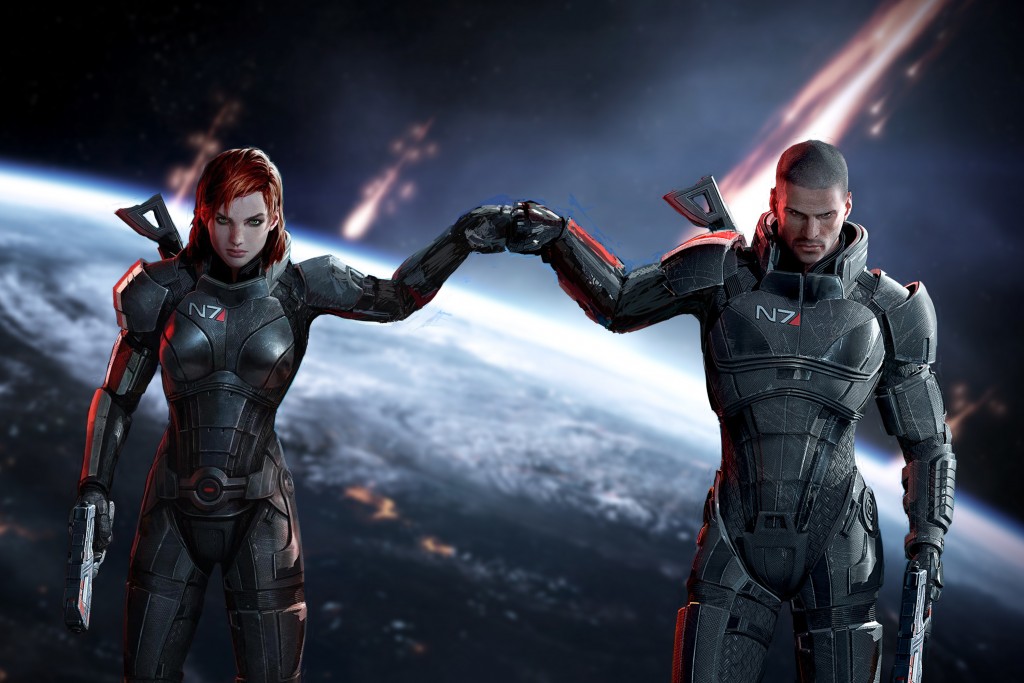
Modern RPGs love to give players choice. We can choose our name, our look, our character stats, even their backstory and personality traits. Many modern RPGs also give you a choice in how the story unfolds. Choice based story-mechanics are now almost standard in the RPG genre, with games like Dragon Age, The Witcher, Life is Strange, and Undertale, giving the player a number of choices that affect how the story progresses. Very often, these choices have an important moral dimension as well. The Mass Effect series is notable for being one of the first series to make extensive use of an dynamic morality mechanic. Frequently, the player is confronted with moral dilemmas: should they save the intergalactic council, or put human priorities first? Which crew member must stay behind to arm the explosive, facing certain death? Should they side with the displaced Quarians, who wish for the return of their home planet, or the Geth, who only wish for their right to exist to be recognized?
Contemporary ethics is normally seen as divided into two main camps, Utilitarianism and Deontology. Utilitarianism, given its most influential formulation by the Enlightenment philosophers Jeremy Bentham and John Stuart Mill, is the view that the morally correct action is the one that generates the most happiness for the most amount of people. For utilitarians, whether an action is morally good depends upon the consequences of the action. This view implies that which action is the morally correct action depends heavily upon the situation. In contrast, deontology is the view that moral decisions should be based upon universal moral rules and principles. Deontology is most famously associated with the German philosopher Immanuel Kant. According to a deontological framework an action is right only if it is dictated by a universal moral law. Such laws include things like “One should not steal” or “One should not treat another person solely as a means to an end.” This view implies that whether or not an action is morally correct does not depend upon the situation; some actions are wrong to do no matter what and some actions are morally required in all circumstances.
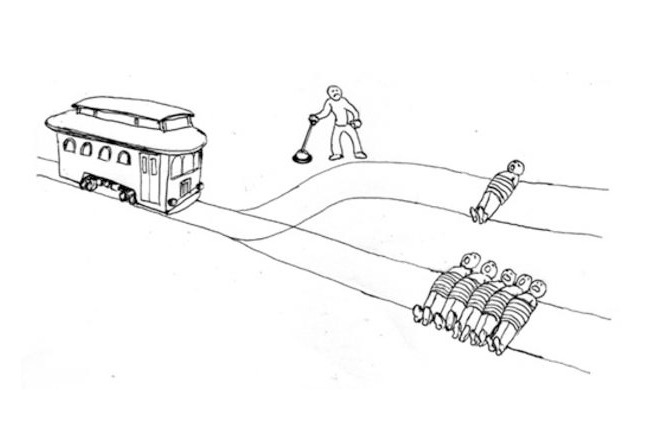
RPGs with moral choice mechanics, such as Mass Effect, require one to take their time while playing, and weigh their options carefully when making decisions. The decisions we have our characters make is indicative of our own moral values, and games with moral choice mechanics inevitably require us to reflect upon our own moral beliefs and commitments. We ask ourselves questions like: Do the ends justify the means? What obligations do we have to other humans? In doing so, we may sometimes find a contradiction or tension in our moral beliefs that must be resolved. Video games can function as ethical thought experiments, like the famous Trolley Problem thought experiment. They pose a scenario to you, ask you to make a choice, and reflection upon the scenario brings to light your own intuitions about right and wrong.
Ocarina of Time: Time Travel and Causal Paradoxes
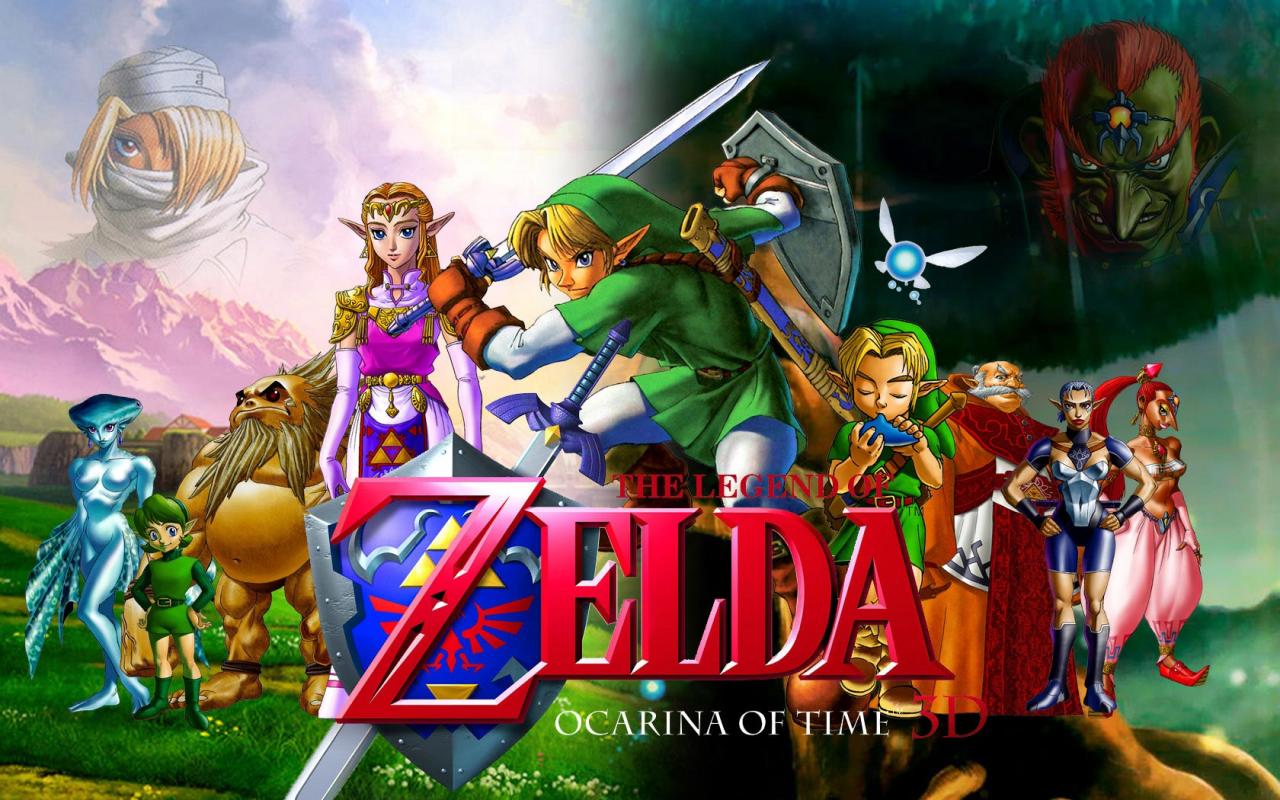
Aside from being one of the most mechanically perfect games of all time, Ocarina of Time was also a breakthrough in storytelling for the Zelda series. New technology, more resources, and a larger budget meant that the series could focus more on storytelling and narrative, as well as tight, controlled gameplay. Time plays an important role in the story of Ocarina of Time. The game requires the player the change between Young Link and Adult Link by using the Master Sword to travel between the past and future. Sometimes, actions/choices made in the past affect the state of the world in the future. Other times, the direction is reversed. The first time the player learns the Song of Storms, they are taught the song as Adult Link by a windmill caretaker. The caretaker proclaims how he learned the song seven years ago when some young child came into the windmill, played the song, and caused a massive storm. The player must then go back in time seven years, and play the song at the same windmill in the past in order to set up further events in the games story. Of course, the end result of this plot element is that the windmill caretaker learns the song from Child Link in the past, who learns the song as Adult Link from the windmill caretaker in the future, who learns the song from Child Link in the past, who learns the song as Adult Link from the windmill caretaker in the future… We run into a paradoxical loop that seems to have no end. If so, then where did the song originally come from? At each step, we account for the existence of the song because they learn it from someone else, ad infinitum.
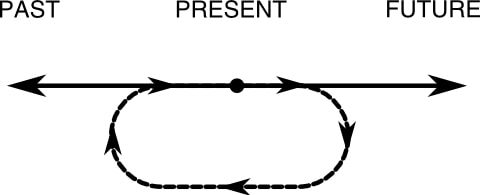
These kind of temporal and causal paradoxes have been seriously considered by philosophers and scientists. The philosopher David Lewis was famous for his writings on the logical issues associated with time travel. What does it mean to “travel” through time? How can one affect the past, if the past no longer exists? Are genuine causal paradoxes possible? Consider the famous grandfather paradox: Could you go back in time and kill your own grandfather? In one sense, it seems possible; you are willing, you have the knowledge to do so, and the appropriate time. Of course, if your grandfather were killed in the past, then how could you exist to go back and kill him in the first place? A paradox arises. Although such scenarios sound impossible, modern science suggests that it is indeed possible for something to affect itself in the past. According to General Relativity, the dominant theory on the nature of space-time, it is possible for a space-time to exist in which an object’s world-line eventually terminates at its own starting point. In other words, it is possible that an object moving through space-time could curve around and end up at the exact same point in space-time that it started at. Such an object could theoretically interact with itself in the past, thus producing a causal loop.
Time is a fundamental constituent of human experience. Games like Ocarina of Time provide a framework to conceptualize time in a way that is at different than our experience of time. They allow us to ask questions like: Do the past and the future exist, or does only the present exist? Why does time seem to go in one direction, past to future? Is the flow of the present actually an illusion? Is time infinite, or did it have a beginning? Ocarina of Time and other games that deal heavily with notions of time, such as Chrono Trigger, play with our experience of time and give us a means to represent other ways time could be.
What do you think? Leave a comment.











Lovely list. I want to add The Witness. It is a rewarding meditation on intellectual humility and its relation with epiphanies and flashes of insight.
This is essentially a puzzle game right? (not to diminish it)
Yes, but there’s much more to it. If you’re familiar with Blow’s previous game, Braid, you know that there’s lots of supplemental material that illuminates the game’s themes and adds texture to the world you’re exploring and to the gameplay.
IMO, The Witness and Braid both marry gameplay mechanics and theme in a way that’s light years ahead of anything else I’ve ever played. Solving the puzzles in The Witness goes hand-in-glove with the game’s big picture.
I haven’t played it, but watching my partner fight, argue and head-butt his way through Mass Effect games with his female Shepard has been like enjoying a very long, hugely epic and exciting movie with interesting and detailed races not just fighting, but negotiating. Big difference, there..
Excellent and well reasoned evaluation of the games!
Ocarina of Time was one of my fav games, and one of the very few games whereby as soon as the credits rolled after completion, i immediately replayed.
Great list, I was drawn to it originally due to the picture of Link, as I thought that Ocarina of Time really did make me think about time as a construct and how vital it is to tell a story. Often, we see everything chronologically, and anything that deviates from that will surely make a reader/player/viewer think twice about the order of events, and why that order is so important.
Enjoyed the read!
Well-thought list, and some nagging questions illustrated by the games on it. When will games become mainstream? I think we are in that moment now. I’ve never before seen so many people playing games like Fortnite. It used to be, at a family party, a group of gamers would head to the basement and have it out. Now, everyone is logging in on their phones for a quick session. There’s not much to philosophize about with that game, but it could open the door for more intellectually stimulating games later.
I really enjoyed this discussion. Obviously not all games can be read in such a way, but I think the ones that can are stronger for it. It is an interesting aspect of humankind that we create games, a form of base entertainment, to still challenge our perceptions and understandings of life. Thanks for sharing your great article.
Final Fantasy VII is another one that belongs here. It’s older sure, but more relevant than ever. Evil corporation doing naughty things for the sake of profit? Check! The greed in question resulting in environmental catastrophe? Check! Underdogs coming together to fight the system? CHECK!
I was originally considering FF7 for the list, specifically its views on environmental ethics. But ultimately, I feel as if the game did not fully elevate that issue to one of the central themes of the game.
Great essay! I enjoyed reading it.
If you want to think about environmental ethics (including wanton destruction, consumption, waste, conflicts over resources, etc.), consider the Fallout series. You can play Fallout 4 for days on end, especially if you play on Survival mode, scrounging through a post-apocalyptic wasteland in search of edible items or junk items to repurpose and completely forgetting about the main storyline.
SOMA is a phenomenal exploration on identity. I really enjoyed it and thought about it for days.
You covered this topic really well. The games that I teach in a class on philosophy and pop culture: This War of Mine (ethics in wartime), Papers Please (political philosophy and borders), The Stanley Parable (free will). I have a few others, but I’m likely going to change them the next time I run the class and do SOMA, Journey (if I feel like bringing my PS4 into class), The Talos Principle, and maybe a few others instead.
Bioshock to me is one of the most representative games of Objectivism. The game references the philosophy multiple times, and shows what an uncontrolled capitalistic economy looks like. This can also be seen in the prequel “Burial at the sea”. I highly recommend this game because of the story, gameplay, and actual setting.
Well said! I think dystopian objectivism has been getting more popular lately, but critiques of capitalism that follow the same lines have been around a lot longer than Ayn Rand’s work.
If you want some philosophical games, I’d recommend the YouTube channel “Errant Signal”, who does more in-depth analysis’ at games, especially more thought-provoking indie ones that might escape your radar otherwise.
I love the Mass Effect IP, and the complex stories it weaves so seamlessly.
Great article. This does make me nostalgic.
Although I’ve tried several times, for some reason I have never been able to get into the Metal Gear games. I just find stealth really boring, I don’t like to hide from enemies.
Excluding the most recent entry (Survive) and the spinoffs, the Metal Gear series has always strived to pose philosophical questions. Even as far back as the original MSX instalments, Hideo Kojima has been committed to engaging the player and making them think for themselves and expand their conciousness through the medium of video games. I look forward to seeing what he chooses to focus on with the upcoming Death Stranding.
How is Talos Principle not on this list?
This article made it clear that I do not play enough video games! It’s fascinating how people are making this entertainment meaningful for “real life”. I loved Ocarina of Time for the story, but the philosophy didn’t hit me until I read this article since I was a kid when I first played it! I clearly need to replay now that I have a different outlook.
Great list!
As a gamer myself, I am always awe-struck by non-gamer’s ability to almost degrade video games with words like “repetitive” or “It’s just shooting”. Yet, these are examples of games that present higher truths of the world. They are trying to teach you something about your world and about your life. They aren’t “Brain-numbing” or “Idiotic”, they are interesting and informative about your life, your environment. You just have to listen and take it in.
I was pleased that you used some game titles that weren’t as well known such as MGSV and SOMA. I had never heard of those games before and its always fun learning something new. Keep up the good work.
Never played a Metal Gear Solid game, might give V a go.
Played 3-4 hours of MGSV last night and initial reaction is that it could well become the greatest game I’ve ever played; understand if some people don’t like/can’t get into it, the MGS plot is one of the most complex things you’ll ever encounter, and where other’s eased you into the weird worlds this one starts off with “Here’s the devil and his emo sister on a flaming horse”.
The Legacy of Kain series should be, imo, your first stop for Philosophy and Video Games.
The nature of Free will is essentially the heart of the entire series and often takes center stage during conversation. Best of all, it is arguably the best written game of all time. The dialogue sounds like something written by a great dead philosopher, or Shakespeare. It’s an absolute pleasure to play through. Can’t recommend enough.
Papers, Please is a great one for ethics.
Mass Effect is a favorite of mine. The story is so deep and awesome that I can overlook the “not perfect” ending to appreciate the greater story being told by Bioware.
I love this article. I feel like too few people play these games without batting an eye to the deep and philosophical meanings behind them. One of my favorite games with an overarching philosophical theme is “Dishonored.” You must make decisions that in turn affect the outcome of the game. Every person you kill in order to complete a task increases the amount of disease present in the environment. Killing may make a single moment easier, but it will eventually increase the overall difficulty of the game as it progresses. My favorite aspect of the game is that the developers created it so that it is possible to complete it without killing a single person. This is incredibly difficult, but the reward is both fulfilling, and a bragging right. I would love to see more games in the future implement this type of decision making beyond simply making choices from a list like in “Mass Effect.”
Great list and what a thinker! I love Ocarina of Time, and so many questions rise about time while playing. As a child I wondered if time travel was possible, in the way that Link traveled. But one of the biggest questions I had was what happened between the 7 years? That’s where the Zelda timeline theories come in.
This is a very interesting read! I feel like video games are often thrown in the category of low art, with content that rarely stimulates the intellectual part of the brain (or, at least the mainstream games are). Yet this proves that they can be more than just mindless ways to escape the real world. Not only do these games have themes that imbed themselves with profound theories and thought-provoking storylines, but they also stick some hard truths in the faces of the players and force us to immerse ourselves in projections of our world where the answers to big philosophical questions aren’t merely black and white.
The list is amazing and as a regular consumer of video games am gladdened by the content of this article.
To expand upon the Soma section, the game also touches upon the Ship of Theseus paradox: If you were to replace every piece of the ship over time, would it still be the same ship?
There’s also an expansion of the paradox that asks if something completely new was built out of the original pieces, would that new “something” be the original?
If there ever was a sequel to this article, might I recommend doing sections on Majora’s Mask and Chrono Trigger?
That was a really great article and like danderson said, its good you used some not very popular titles.
The only one of these I have played is Bioshock Infinite, and I can’t say I found any deep burning philosophical questions in it, it was a very pretty but only moderately immersive game, it was left for dead by the earlier Bioshocks, where uniquely the questionable philosophies of Ayn Rand were taken out for a good ride. Love or abhor Rand, I can rarely recall a game where philosophical considerations were of such paramount importance and so cleverly worked into the games.
Intriguing article with an apt selection of case studies. I was delighted to see Chrono Trigger mentioned at the end, and it would have been fascinating to see that explored in more detail. Not only is it one of the earliest examples of a time travel paradox game, it also explores other philosophical questions such as euthanasia, fatalism and the existence of a higher being. I also think its take on time travel is deeper and more mature than in Ocarina of Time. Good job on the whole though!
I wish I still had the time to play games like this… Job, wife and kids….
Majora’s Mask has a great many questions asked in it, altough I find it difficult to pinpoint them myself. The end is escpecially poignant and effective considering the story, as is how the activities of link get attributed to whatever mask he has on at the time.
What a fascinating analysis! I’m not a gamer myself, but your thorough and philosophically informed examination of these games made me wish I was. Having majored in philosophy myself, I appreciated how clear, accessible, and yet thorough and precise your discussion of these often esoteric topics was.
It is worth noting that Mass Effect is a good example of how difficult it is for a game to actually make choices matter – the entire series came down to three near-identical endings, despite all the individual choices the player made throughout.
This was really well thought out and executed. I like that you chose different genres of games to exhibit in your example of this. Well done! I’m interested to see what else could be done for other games, see if there is a common theme between them asking and answering questions.
Fantastic list! I enjoyed the different genres and styles of games you picked. I’ve only played BioShock Infinite from your list, but I have watched a playthrough of SOMA.
Growing up, I played a lot of pretty basic games that I loved but had nowhere near the level of thought and nuance that now seem common. I’m grateful that game creators have found a way to raise the vernacular to that of art, with the ability to explore the complexities of reality and how we experience it. There seems to be great potential for games to completely transcend the box they have been placed in and move from entertainment to transformative tools, especially with the unprecedented advances in VR/AR tech. Excited to see what the future holds!
An excellent list, Mass Effect, and Zelda are still two of my all-time favourite games. I remember playing Ocarina of Time in my early teens on the N64 and my nieces and nephew are currently playing it on their DS.
Although the writing can be heavy handed, Detroit: Become Human is a recent game that raises some interesting moral dilemmas.
Great list. Bioshock Infinite got me back into gaming, I spent weeks trying to understand as much as I could about that universe and all the questions it posed.
Darn, these are all games I have yet to play and don’t want to get spoilers. *Adding them to the long long list.*
Fantastic article, well done, very insightful
This is what makes video games such a great art form.
The indie game INSIDE presents many philosophical questions as well. The ending message is still not definitive and everyone I’ve talked to has different interpretations of it.
Also, I never did finish Bioshock Infinite. Perhaps I should.
I believe that Bioshock was influenced by the works of objectivist philosopher Ayn Rand, most notably her novel ‘Atlas Shrugged’, which depicts the ‘prime movers’ (creative capitalist elite) holding a ‘strike’ of sorts against the socialist masses (who took power) by exiling themselves from society. This motif is found in both Bioshock and Bioshock: Infinite where the business elite in the former and a religious sect in the latter form their own basis of what a utopia should be (horrifyingly depicted in the game I might add).
Anyways, this article is a nice example of how games can be influenced by philosophy. I hope to see maybe a game of Ayn Rand’s other masterpiece: ‘The Fountainhead.’
The Song of Storms paradox always messed with my head. If I remember correctly, the windmill caretaker gets mad at you, but I wouldn’t know if it was before or after Link grows up. For some reason, the fact that he gets mad (well, you do mess up his windmill) adds a layer of melancholy to the seemingly inescapable loop, and you, as Link, are the only who knows this. The idea that maybe, just maybe, the world of your save file on a Ocarina of Time cartridge or ROM, is the window to an actual dimension where this things happen is a haunting one.
Now, not to get too deep into this, but according to the Zelda wiki on Gamepedia.com, the Song of Storms is written by the Composer Brothers in Majora’s Mask, or at least it is taught to Link by one of them; and, in Oracle of Seasons, what appears to be the same windmill caretaker from Ocarina is playing it with his phonograph. Furthermore, according to the official timeline, Oracle of Seasons comes after Ocarina of Time, so, the questions stands: who made the Song of Storms? Is this dimension one where Koji Kondo is an omnipresent God?
I’ve got to add Pokemon Black/White to this list with its truths/ideals philosophy. For once, the underlying problematic use of pokemon was being confronted by the villain team, giving, finally, a plethora of morally grey characters. It is a shame, however, that the end of the game did not maintain this complex theme.
You could argue that KotOR 2: The Sith Lords explores philosophical themes and ask questions about ethics.
Namely, the example of the character Kreia, who breaks the mold of the usual Jedi Masters and Sith Lords throughout the series, and who is probably the most self-aware character ever created in the Star Wars franchise. The actions that she would consider moral or immoral–or rather, acceptable or inacceptable–call into question the classic problem of ontological vs deontological ethics.
So glad to see Legend of Zelda there. Definitely deserving of a spot in an article with this title.
Great article. I just wanted to give a few observations on the games I’ve played.
Bioshock Infinite: The many-worlds interpretation has been explored by a lot of movies and literature and some video games before Bioshock Infinite (eg. Singularity), so the philosophical questions I was most interested in with this game involved power and gender theory. The main character is the villain from another dimension, but his overbearing desire to protect his damsel in distress creates a lot of problems for everyone (similar to The Last of Us). The sequels show an independent Elizabeth kicking butt as she travels to Rapture in the future, where the first two Bioshock games were set.
SOMA: Thanks for including this game. I think this magazine needs more representation when it comes to indie games. Really, there are a ton of indie games that address such concepts (The Talos Principle, Cradle, The Void, etc.). I found the same things interesting, but I’d like to add one more. When the player character switches from one robotic body to another (and he does so periodically throughout the game), the previous body (along with the character’s consciousness) is left behind, trapped until its battery runs out or he is depowered and effectively destroyed. So the question is, when a brain is copied, is it ethical to destroy the previous version? The thought of another me trapped alone and forgotten in an underwater lab still haunts me.
Chrono Trigger: Good that you brought up Chrono Trigger. It bugged me that in CT you could go to the future, collect an item, then go to the past and collect the past version of the same item, and still have both items!
I really like the inclusion of ocarina of time here!! though easily overlooked, OoT definitely stands as one of the darkest Legend of Zelda games, and not just because of the implications of the time travel (consider that after child link returns to his past, that Zelda is left alone, with quite literally every relevant authority figure residing within her domain deceased, not to mention how little habitable territory actually remains for Hylians).
Death is both inevitable, unfair, and poisonous in the way that those who are left behind cannot escape its impact.
Link, even if he does get to relive his childhood, cannot forget what he’s experienced, and he doesn’t even get to keep Navi anymore, his only friend who stuck with him for the *entirety* of the game’s events. She doesn’t even say goodbye.
I think my personal thing to ponder is the status of Link’s ‘soul’, if that makes sense. Is he still a child? Or did having the responsibilities of an adult man thrust upon him without warning age him? What must it be like to feel permanently out of time, regardless of the accuracy of your body to the amount of time you’ve been alive?
I just find it a particular poignant, if melancholic, reflection on childhood trauma and the sense of never being able to return to what was lost, and being forced to build something new, whether you want to or not. As the game’s advertising slogan said: will you sink, or swim?
Nice. Really nicely put together list. Where’s Braid though?! 😉
This is a great list! Some of the other games I can think of are Papers, Please, Braid, OMORI, The Stanley Parable, and Simulacra. They all are greatly designed to ask questions, making the choices hard and reflective.
The epigraph at the beginning of this article is on of the most unusual things I’ve ever seen in formal writing.